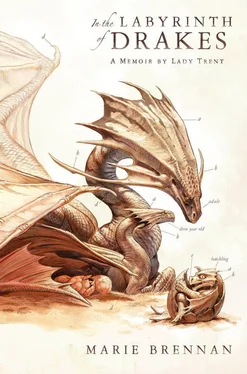“It is not you,” Suhail said. He spoke with conviction—as if his conviction could convince the world. “Isa—Umm Yaqub. I have nothing but the greatest respect and admiration for you, and will defend that against any man who says otherwise. But it is on behalf of your good reputation that I must not go with you. To travel like that, with a woman who is neither my kin nor my wife…”
“Then what if we were married?”
I sometimes imagine there is a clerk behind a desk situated between the brain and the mouth. It is his job to examine utterances on their way out, and stamp them with approval or send them back for reconsideration. If such a clerk exists, mine must be very harried and overworked; and on occasion he puts his head down on the desk in despair, letting things pass without so much as a second glance.
Suhail stared at me. Then he looked at the floor. Then out the window. Then, in an uneven voice, he said, “A limited-term marriage? As you did with Liluakame, in Keonga. It… could work. The Sheqari school of jurisprudence holds that such things are permitted; the Taribbi says they are not. My brother is an adherent of the Uwani school, which has not rendered an opinion either way. But it might be possible.”
Until he mentioned them, I had not known that limited-term marriages existed in Amaneen legal thought. It was an elegant solution: as he said, I had done something of the kind in Keonga, when I married and then divorced Liluakame so as to satisfy the demands of my status as ke’anaka’i. I might do the same here, silencing the gossips by making an honest woman of myself, so to speak. Of course it would cause even greater scandal back home when the marriage ended—we certainly did not have such arrangements in Scirling law—but for now it might suffice.
The clerk was still derelict in his duty. I said, “It was not a limited-term arrangement that I had in mind.”
Suhail went utterly still. Then, very carefully, he spoke. “Did you just ask for my hand in marriage?”
My face could not have been hotter had a drake breathed on it. But I had advanced too far to retreat; the only way out was through. “I suppose I did. Dear heaven.”
We sat in silence. I could not look away from Suhail, nor him, apparently, from me. I could have drawn his portrait with my eyes closed; I had sketched him once during our voyage, and had looked at the image more times than I should admit in the years since. I thought of trying to find him long before I knew I was coming to Akhia. I never had the courage to follow through.
As a young woman, I had naively thought that I wanted Jacob Camherst to be my friend, because I could not conceive of a man being both friend and husband. But so he had been: husband first, then friend, as we inched our way toward something like a working partnership. Ill chance, however, had taken him from me before we could progress very far. Suhail had begun as a friend, and so I had thought of him, with great and focused determination… but that was not the entirety of what I wanted.
He said, a little breathlessly, “Everyone says you have no intention of marrying again.”
I would have asked who everyone was and why they thought this was any of their business—but the matter at hand took precedence. “I had none. Until this very moment. Intentions change.”
“Why?”
It was the same question I had asked Jacob, the day he came to propose marriage to me. I felt belated empathy for him, being put on the spot in such a fashion. “Because… because I do not want to go into the Labyrinth of Drakes without you. Never mind the practicalities of it; that is what we have al-Jelidah and Haidar for. I do not want to see that place without you at my side. I want you to show me the ruins that inspired you, and I want you present for any discoveries I might make. Now, and always.”
I paused to swallow. My mouth had gone very dry. “I—I said a thousand times that I had no interest in marrying again because marriage would almost certainly place restrictions on my life. A widow has freedoms a wife does not. But when I look at you, I do not see obstacles for my career, I see—” My face burned even more. “I see wings. A way to fly higher and farther than I can on my own.”
Far, far too late, it occurred to me that Lieutenant Marton could almost certainly hear us, as could anyone passing by the window.
Suhail eased forward in his chair. His eyes flickered as he searched my face: for what, I could not tell you. Evidence of insincerity? Of love? Of incipient lunacy? He would not find the first; the second, most definitely; the third, quite possibly.
The clerk had woken up at his desk and was frantically sorting through his records of what had transpired during his delinquency. Stammering, I said, “But you were considering only a limited arrangement. I presume too much, suggesting—”
“You presume nothing that is not true.”
I fell silent, save for the beating of my heart, which felt as loud as a drum.
“I would marry you,” Suhail said, “even if it meant my brother disavowing me on the spot. Which, I should warn you, he may do.”
What would my mother say? I lost one husband in Vystrana, and found another in Akhia. Suhail’s was not the only family that might have pronounced opinions on this matter. “We shall simply have to support ourselves with archaeology and dragons.”
Suhail laughed, and it was the light, joyous sound I had first heard during the voyage of the Basilisk. “I honestly cannot tell whether you are the most practical woman I have ever met, or the most deranged.”
“Why can it not be both?” I said. Inside I was soaring, as I had in the caeliger, on the glider I had called Furcula —only this time, I would not crash. “Now, before I commit an act that truly will start a scandal, tell me: how does one get married in Akhia?”
* * *
When I went in search of Andrew, I found him talking to Tom, with a demeanour I instantly recognized as suspicious.
Putting my hands on my hips, I glared in mock outrage at my brother and said, “Have you been delaying Tom on purpose?”
“Oh, good God,” Tom said, taking out his pocket watch. “Have I been keeping Suhail waiting?”
“Not in the slightest.” I advanced on Andrew, who retreated with a sheepish and hunted look. “I do not know what you intended, dearest brother, but you shall pay the price for your interference. Have you no care for your sister’s reputation?”
“I—”
“This shall be your penance. You must come with us to the judge and stand as witness to our marriage.”
There are certain moments in my life that I treasure. Most of them in one way or another have to do with dragons… but not all. The look on my brother’s face in that instant is one of the latter.
* * *
It was not quite so simple as that, of course. We needed a marriage contract, though it was considered sufficient under Amaneen law for the two of us to sort it out verbally in front of the astonished judge. Suhail had to give me a bridal gift; he offered the best camels and horses and all the supplies I might need for my second excursion to the desert, and I agreed that he need not present those things to me before the marriage itself was formalized. We rushed through these matters, for after so long spent pretending we were nothing more than respectful colleagues, we were eager to have the thing done.
I feel obligated to say I do not actually recommend such behaviour to young people (or even those not so young). There were a hundred questions Suhail and I did not answer before we wed. Our heady excitement carried us over them at the time… but sooner or later we must come down to the ground, and crashing, to return to my previous metaphor, was a distinct risk. I was from Scirland, he from Akhia: where would we live? His people do not have family names in the same manner as Scirlings: would I become Dame Isabella ibn Ramiz, or he Mr. Camherst, or some third alternative entirely? Amaneen custom says that the children of an Amaneen man must be raised in his faith, while Segulist custom says that the children of a Segulist woman belong to her faith: how would we resolve this dilemma? These are but three of the issues that would have been settled in any properly thought-out marriage contract, as opposed to the hasty verbal arrangement we made that day. There are any number of men and women who have rushed into such matters, expecting their love to overcome all complications, only to find later that it is not so simple.
Читать дальше












